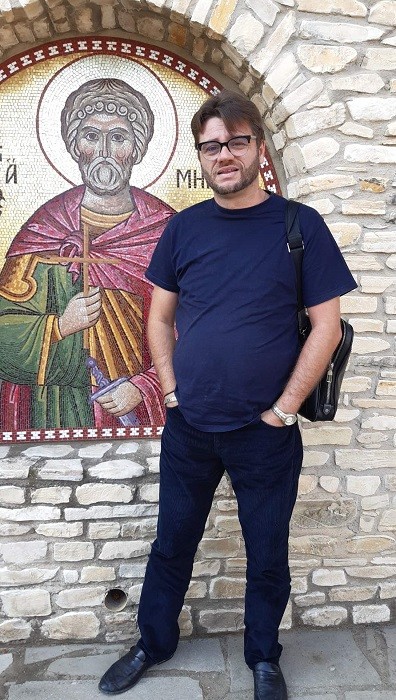"Greetings to everyone from sunny Cyprus! The weather here is wonderful and it is really unfortunate that we are locked in our homes, but we must stay disciplined until the end”, are the words of Bulgarian national Dobrin Dobrev who has been living in Cyprus for years yet never severing the link with his homeland. Even months ago, he recorded beautiful folk songs from the Dobrudzha region for the fund of the Bulgarian National Radio.
 As is well known, Bulgarians have been living in Cyprus since the Middle Ages, although they are not present as a separate ethnic group in the census in the country. Today, they are around 25,000, but according to Dobrin Dobrev, their numbers are steadily declining.
As is well known, Bulgarians have been living in Cyprus since the Middle Ages, although they are not present as a separate ethnic group in the census in the country. Today, they are around 25,000, but according to Dobrin Dobrev, their numbers are steadily declining.
Dobrin is a talented folk singer but he also has a literary gift - he writes poems, essays, short stories, and has published books. He spent his childhood years in Dobrudzha, a region in North-eastern Bulgaria. Later, folk singer Verka Siderova, one of Bulgaria’s golden voices, accepted him as her student and this changed his life. What is Dobrin Dobrev doing currently in Cyprus and what are the restrictive measures taken by the people there - here are the answers:
"I think Cyprus is handling the quarantine very well. With few exceptions, people are disciplined and abide by the measures imposed by the government. Otherwise the fine ranges from 300 to 400 euros. We go out once a day for two hours, after sending a text message. There are grocery stores, pharmacies open. Charter flights are being made, as a few days ago there was a flight to Bulgaria, with the assistance of our embassy here. Anyone who has returned to Cyprus goes to the places designated for the mandatory 14-day quarantine, usually hotels. Coronavirus tests were assigned to all workers in food, beverages, bakery and supermarket stores. I am the manager of the Limassol information centre and the owner of a Bulgarian food store. My work is connected with many of our compatriots. I'd say they're feeling good right now. At least I am not aware of any Bulgarians affected by the coronavirus. Many of them say that they want to leave Cyprus permanently, which is good for me because Bulgarians belong in Bulgaria. On the Easter holidays, all churches here were closed and church services were broadcast on national television. These days I often think of a verse from Bulgarian poet Valery Petrov: "People, don't be sad, good letters are on their way!"
Dobrin Dobrev uses the period of the quarantine to work on a new repertoire. He does not hide the fact that he has received an invitation from the Bulgarian National Radio to record new songs.
"I also read books, listen to music, and it fills my whole world. I want to wish everyone in Bulgaria health, optimism, courage and patience!
In conclusion, I would like to say that today the great singer of Dobrudzha, my dear teacher Verka Siderova, turns 94. May she be alive and well! And may us all learn from her wisdom and have her strong spirit. And let us enjoy the enormous wealth of folk songs that the Bulgarian National Radio stores and shares generously on the airwaves with its fans. "
English Rossitsa Petcova
Photos: BGNES and private library
October 17, 2025 will go down in history as the date on which the Minister of Culture of Hungary presented the document with which the Tradition of Bulgarian Gardening in Hungary officially entered the UNESCO National Register of..
The center of Bulgaria's town of Asenovgrad is today turning into a colorful scene of flavors, aromas and traditions, in which the spirit of the Red Wall Biosphere Park comes to life , reports BNR's Radio Plovdiv. At the “Festival of Crafts and..
"Folklore is a need for humans and this need will not disappear just like that, " says Assoc. Prof. Dr. Natalia Rashkova - ethnologist and folklorist, university lecturer and researcher with a strong contribution to the study of..
The Bulgarian National Radio hosted the annual Public Broadcasters International (PBI) Conference for the first time. Heads and representatives of public..
Long-distance sailing captain Svetlozar Tenev has set off from the port city of Varna on Bulgaria's northern Black Sea coast on a circumnavigation of the..
A celebration of children’s love of books and imagination will take place on 25 October in Los Angeles, organised by the Bulgarian School “St. St. Cyril..

+359 2 9336 661
